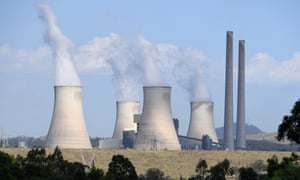A major environment group has blasted Australia’s political parties for squabbling while energy security suffers after a Senate inquiry into the retirement of coal-fired power stations split three ways.
The Senate’s environment and communications references committee has been inquiring into mechanisms for an orderly transition away from coal-fired power to lower emissions energy sources for several months.
At the conclusion of the deliberations, the Greens, Labor and the Coalition all produced separate reports about the best way to manage the change, which were tabled in the Senate on Wednesday evening.
The main report, authored by the Greens, called on the government to adopt a national energy transition plan and a mechanism for the orderly retirement of coal-fired power stations. It also recommended the establishment of an energy transition authority to manage the transition for affected workers and communities.
Labor produced a separate report calling on the government to establish mechanisms to support a “just transition” including a national framework for worker redeployment schemes modelled on the Victorian government’s Latrobe Valley worker transfer scheme.
The Coalition declared the majority report did not “adequately or fairly reflect the evidence presented to the committee”.
“Further, the Coalition senators object to the ideologically driven conclusions, which are counter to the government’s technology agnostic policy approach.”
The Australian Conservation Foundation blasted the rolling contention among Australia’s parliamentarians over climate and energy policy.
“The final report into the closure of the coal industry, with dissenting reports from both Labor and Coalition senators, highlights the squabbling that has characterised energy policy in Australia over the last decade,” said the ACF’s climate change program manager, Gavan McFadzean.
McFadzean said the ACF had “come to expect fossil fuel ideology and nonsense from the Coalition but we are also disappointed federal Labor have missed an opportunity to show courage and lead in the inevitable structural reform, by failing to agree the early and orderly closure of Australia’s coal-fired generation capacity”.
“Unless parties can start working together to ensure a just transition for workers, both they and Australia’s energy security will suffer.”
The Senate’s environment and communications references committee has been inquiring into mechanisms for an orderly transition away from coal-fired power to lower emissions energy sources for several months.
At the conclusion of the deliberations, the Greens, Labor and the Coalition all produced separate reports about the best way to manage the change, which were tabled in the Senate on Wednesday evening.
The main report, authored by the Greens, called on the government to adopt a national energy transition plan and a mechanism for the orderly retirement of coal-fired power stations. It also recommended the establishment of an energy transition authority to manage the transition for affected workers and communities.
Labor produced a separate report calling on the government to establish mechanisms to support a “just transition” including a national framework for worker redeployment schemes modelled on the Victorian government’s Latrobe Valley worker transfer scheme.
“Further, the Coalition senators object to the ideologically driven conclusions, which are counter to the government’s technology agnostic policy approach.”
The Australian Conservation Foundation blasted the rolling contention among Australia’s parliamentarians over climate and energy policy.
“The final report into the closure of the coal industry, with dissenting reports from both Labor and Coalition senators, highlights the squabbling that has characterised energy policy in Australia over the last decade,” said the ACF’s climate change program manager, Gavan McFadzean.
McFadzean said the ACF had “come to expect fossil fuel ideology and nonsense from the Coalition but we are also disappointed federal Labor have missed an opportunity to show courage and lead in the inevitable structural reform, by failing to agree the early and orderly closure of Australia’s coal-fired generation capacity”.
“Unless parties can start working together to ensure a just transition for workers, both they and Australia’s energy security will suffer.”

No comments:
Post a Comment